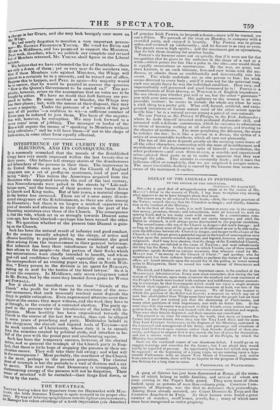THE THEATRES.
TRAGEDY having taken her departure from the Haymarket with Mae- ItADY, the little Summer Theatre is again restored to its proper chit. ruter. By way of inf using sprightliness into the lighter entertainments, Ise Manager has taken advantage of a fresh importation (via America) of genuine Irish POWER, to bespeak a dozen—more will be wanted, we can tell him. We partook of the treat on Monday, in company with a crowded party, and enjoyed it heartily. The Powea was in prime order, and creamed up exuberantly ; and its flavour is as racy as ever. The guests were in high spirits ; and the merriment got so uproarious, that we left them shouting for another bottle.
POWER'S sly humour oozes out so quietly, that if it were not for the recognition that he gives to the audience in the shape of a nod or a wink—which points the fun like a poke in the ribs—one would think it equally unconscious as spontaneous. By the way, no actor, not even LecroN, is on such intimate, free-and-easy terms with the au- dieoce, or admits diem so confidentially and unreservedly into his secret. The whole multitude are as one person to him : his wink seems directed to every body ; and if it were not for the universal roar, each one might fancy he was the individual confidant. How easy, and imperturbably self.possessed and good.humoured he is ! POWER is a personification of Irish blarney, as WRENCH is of English impudence: the one cheats you whether you will or no, but the other " gammons" you with your own consent. His gallantry to the women is an irre- pressible instinct : he seems to include the whole sex when he says a civil thing to a pretty girl. What stiff, formal, artificial, and exag- gerated imitations of human nature most of the other actors appear beside him ! he is a natural person among a parcel of non-naturals. We saw PowEit as Sir Patrick O'Plenipo, in the Irish Ambassador; where he finds himself invested with profound diplomatic skill, and intrusted with a delicate commission, which he executes to admiration in virtue of knowing nothing at all about the matter, and trusting to the chapter of accidents. The more perplexing the dilemma, the more he relishes the fun : he is like a person in a dream, the victim of a series of unaccountable incidents, which all turn out pleasantly. The fun of this piece depends greatly on the seeming earnestness of all the other characters, contrasting with the state of bewilderment and mystification of the diplomatist in spite of himself nevertheless, the other performers—and even STRIEK LAND, a sensible and experienced actor—played their parts so as to make it apparent that they saw through the joke. This mistake is constantly made ; and it mars the ludicrous effect so completely, that we are surprised it escapes notice. The most irresistible drollery is caused by the humour that seems un- aware of the merriment it excites.


























 Previous page
Previous page